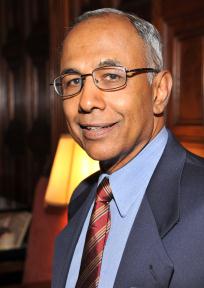Keynote 2: Prof. Chandy
Prof. K. Mani Chandy, Caltech
“Modeling Complex Socio-Technical Systems on Massively Parallel Computers”
 This talk discusses research opportunities for MASCOTS participants due to a confluence of trends in applications, technology and theory. APPLICATIONS: Organizations around the world want to use information technology to support sustainability; for example, the G20 summit in June focused on water, food, energy and health security, and disaster mitigation. Systems that help sustainability are, perforce, socio-technical systems: they are cyber-physical systems that involve people at every stage. TECHNOLOGY: Sensors, tablet and phone computers, Cloud services, and petascale parallel computers are improving rapidly and getting cheaper. The cost-effectiveness of technology enables radically new approaches for critical applications. THEORY: Developments in applications of economics and game theory to information technology systems, machine learning, “big data” architectures, and performance modeling allow novel ways of solving applications that help all elements of society. This talk suggests that MASCOTS participants are ideally poised to make important research contributions in critical applications that exploit the trends in technology and theory.
This talk discusses research opportunities for MASCOTS participants due to a confluence of trends in applications, technology and theory. APPLICATIONS: Organizations around the world want to use information technology to support sustainability; for example, the G20 summit in June focused on water, food, energy and health security, and disaster mitigation. Systems that help sustainability are, perforce, socio-technical systems: they are cyber-physical systems that involve people at every stage. TECHNOLOGY: Sensors, tablet and phone computers, Cloud services, and petascale parallel computers are improving rapidly and getting cheaper. The cost-effectiveness of technology enables radically new approaches for critical applications. THEORY: Developments in applications of economics and game theory to information technology systems, machine learning, “big data” architectures, and performance modeling allow novel ways of solving applications that help all elements of society. This talk suggests that MASCOTS participants are ideally poised to make important research contributions in critical applications that exploit the trends in technology and theory.
Bio
K. Mani Chandy is the Simon Ramo Professor and Deputy Chair of the Division of Engineering and Applied Sciences at the California Institute of Technology in Pasadena, California. His Bachelors is from the Indian Institute of Technology, Madras and PhD from the Massachusetts Institute of Technology in Electrical Engineering. He was a professor at the University of Texas at Austin from 1970 to 1987, and has been at Caltech since then. He is a member of the U.S. National Academy of Engineering and has received several awards including teaching awards. He has worked on performance models of computing systems, parallel event-driven simulation, distributed algorithms, formal methods for reasoning about concurrent systems, parallel computing, and systems for sensing and responding to earthquakes and hazardous radiation.

